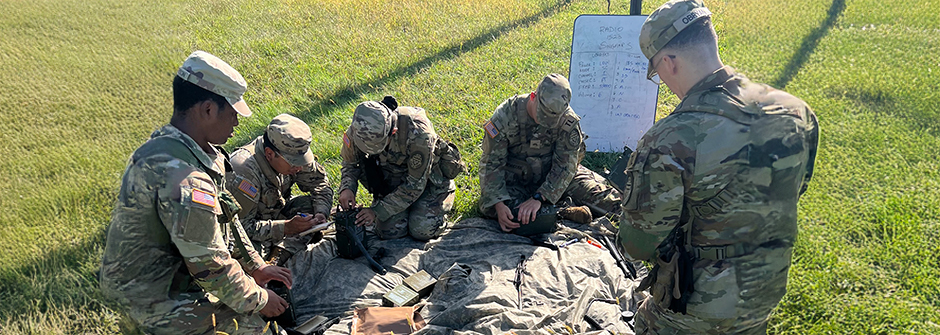
Curriculum and Training
The mission of the Army Reserve Officer Training Corps (AROTC) is to commission future leaders of the United States Army. Since ROTC produces over 65 percent of the Army's Officer Corps, our task is one of the most important undertakings in the Army and our country today. We seek top quality college students. We train these potential leaders, assess their abilities, and challenge them with the highest standards of professionalism. Those who successfully complete the program, receive a commission as a second lieutenant in the U.S. Army. Students may request to serve as an officer in either the active Army, or part time in the Army Reserve or National Guard.
Curriculum
Army ROTC Basic Course
Two Years That Will Prepare You For Years To Come
The Basic Course takes place during your first two years in college as elective courses. It normally involves one elective class and lab each semester along with the requisite physical training and field training exercises. You will learn basic military skills, the fundamentals of leadership and start the groundwork toward becoming an Army leader. You can take Army ROTC Basic Courses without a military commitment.
Freshman Year: Preparing For Success As An Army Officer
Topics covered include:
- Introduction to Army Leadership
- Army Customs and Traditions
- Military Operations and Tactics
- Goal Setting and Accomplishment
- Health and Physical Fitness
Courses and Course Descriptions
ROTC 1010 or ROTC 0110 Leadership and Personal Development
Introduces students to the personal challenges and competencies that are critical
for effective leadership. Instructors explain and illustrate how the personal development
of life skills such as critical thinking, goal setting, time management, physical
fitness, and stress management relate to leadership (in both the civilian and military
environment), officership, the Army profession, and daily life. Leadership principles
within the current context of a university are emphasized. Application is also made
to leadership in military and civilian settings that include government, corporate,
and non-profit organizations. Corequisite: ROTC 5500 or ROTC 0550 Leadership Laboratory
and ROTC 1115 or ROTC 0115 Physical Fitness. 2/0 credits
ROTC 1012 or ROTC 0112 Introduction to Tactical Leadership
Overviews leadership fundamentals such as setting direction, problem-solving, listening,
presenting briefs, providing feedback, and using effective writing skills. Students
explore dimensions of leadership values, attributes, skills, and actions in the context
of practical, hands-on, and interactive exercises and scenarios. Students apply learning
to their immediate university context as well as to a variety of military, government,
corporate, and non-profit situations. Corequisite: ROTC 5501 or ROTC 0551 Leadership
Laboratory and ROTC 1125 or ROTC 0125 Physical Fitness. 2/0 credits
Sophomore Year: The Role Of An Officer
Topics covered include:
- Applied Leadership Theory
- Communications
- Principles of War
- Military Operations and Tactic
Courses and Course Descriptions
ROTC 2020 or ROTC 0220 Innovative Team Leadership
Explores the dimensions of creative and innovative tactical leadership strategies
and styles by examining team dynamics and two historical leadership theories that
form the basis of much of modern leadership frameworks (trait and behavior theories).
Students practice aspects of personal motivation and team building in the context
of planning, executing, and assessing team exercises and participating in leadership
labs. Students study historical leaders from a variety of backgrounds: from Lincoln,
Grant, and Lee to Gandhi, Kennedy, and Mother Theresa. Corequisite: ROTC 5502 or ROTC
0552 Leadership Laboratory and ROTC 1135 or ROTC 0135 Physical Fitness. 3/0 credits
ROTC 2022 or ROTC 0222 Foundations of Tactical Leadership
Examines the challenges of leading teams in complex contemporary operating environments.
Instructors highlight course of action development, analysis, the execution of orders,
and the achievement of mission success. Students develop greater self-awareness as
they assess their own leadership styles and practice communication and team building
skills while studying the theoretical basis of situational and contingent leadership.
Students analyze recent and historical military case studies to gain insight into
the importance and practice of teamwork and techniques in real-world scenarios. Parallels
are drawn to the competitive and cross-cultural environments of most modern corporations.
Corequisite: ROTC 5503 or ROTC 0553 Leadership Laboratory and ROTC 1145 or ROTC 0145
Physical Fitness. 3/0 Credits
Army ROTC Advanced Course
Graduate College With A Degree In Leadership
The Advanced Course takes place during your last two years in college as elective
courses. It normally includes one elective class and lab each semester in addition
to the requisite physical training and field training exercises, plus a summer leadership
camp. You will learn advanced military tactics and gain experience in team organization,
planning and decision-making. To benefit from the leadership training in the Advanced
Course, all Cadets must have completed either the Basic Course or have attended the
Leader's Training Course. Entering the Advanced Course requires a commitment to serve
as an Officer in the U.S. Army after you graduate.
Junior Year: Leading Small Tactical Units
Topics covered include:
- Command and Staff Functions
- Law of War
- Weapons
- Team Dynamics and Peer Leadership
- Military Operations and Tactics
Courses and Course Descriptions
ROTC 3030 or ROTC 0330 Adaptive Tactical Leadership
Challenges students to study, practice, and evaluate adaptive leadership skills as
they are presented with complex scenarios related to the contemporary operating environment
and across the full spectrum of military, corporate, and civic operations. Instructors
and fellow students give students systematic and specific feedback on their leadership
attributes and actions as they are applied in a variety of situations. Self-evaluations
also allow students to develop their leadership skills and critical thinking abilities.
Corequisite: ROTC 5504 or ROTC 0554 Leadership Laboratory and ROTC 1155 or ROTC 0155
Physical Fitness. 3/0 credits
ROTC 3032 or ROTC 0332 Leadership in Changing Environments
Presents increasingly intense situational leadership challenges to build student awareness
and skills in leading small teams of people. Students explore, evaluate, and develop
skills in decision-making, persuading, and motivating team members across a full spectrum
of military, corporate, and civic operations. Apply principles and techniques of effective
written and oral communication. Instructors review aspects of military operations
as a means of preparing students for the ROTC Leader Development and Assessment Course
(LDAC). Corequisite: ROTC 5505 or ROTC 0555 Leadership Laboratory and ROTC 1165 or
ROTC 0165 Physical Fitness. 3/0 Credits
Senior Year: Transition To Becoming An Officer
Topics covered include:
- Training the Force
- Military Justice
- Ethical Decision Making
- Personnel Management
- Cultural Awareness
- Post and Installation Support
- Military Operations and Tactics
Courses and Course Descriptions
ROTC 4040 or ROTC 0440 Developing Adaptive Leaders
Strengthens student proficiency in planning, executing, and assessing complex operations
while functioning as a member of a staff and providing performance feedback to subordinates.
Students assess risk, make ethical and moral decisions, identify responsibilities
of key staff members, coordinate staff roles, and use situational opportunities to
lead, teach, train, and develop junior ROTC Cadets. Apply leadership and problem solving
principles to a complex case study and simulation. Lessons on military and civil justice
and personnel processes prepare students to make the transition to their initial leadership
assignments. Prerequisite: ROTC 3030 or ROTC 0330. Corequisite: ROTC 5506 or ROTC
0556 Leadership Laboratory and ROTC 1175 or ROTC 0175 Physical Fitness. 3/0 credits
ROTC 4042 or ROTC 0442 Leadership in a Complex World
Explores the dynamics of leading in the complicated situations of current operations
in the contemporary operating environment (COE) of the global village. Students examine
differences in customs and courtesies, culture, military law, principles of war, and
rules of engagement in the face of international terrorism. They also explore aspects
of interacting with non-government organizations, engaging in civil duties, and host
nation support. Instructors place significant emphasis on preparing Cadets for their
first unit of assignment. Case studies, scenarios, and exercises prepare Cadets to
face the complex ethical and practical demands of leading organizations of varied
sizes to succeed in a global and complex world. Prerequisite: ROTC 3030 or ROTC 0330.
Corequisite: ROTC 5507 or ROTC 0557 Leadership Laboratory and ROTC 1185 or ROTC 0185
Physical Fitness. 3/0 Credits. Learn more »
Additional Courses:
ROTC 5500-5507 or ROTC 0550-0557 Leadership Laboratory: Applied Leadership and Management
Leadership
Laboratory is designed to provide students the environment and scenarios to lead organizations
of varied sizes (from team to company size). It offers the opportunity to apply leadership
and management principles, theories, and techniques explored in the formal classroom
military science courses. By design, the Leadership Labs are progressive and sequential,
where students are placed in increasing complex scenarios. This is a 2-hour session.
All students accepted as Cadets in the ROTC program are required to enroll in this
course. 1/0 Credit
ROTC 1115, 1125, 1135, 1145, 1155, 1165, 1175, 1185 or ROTC 0115, 0125, 0135, 0145,
0155, 0165, 0175, 0185 Physical Fitness: Developing Personal and Organizational Physical
Fitness Programs
This is a one-hour physical fitness session focused on building the physical and mental
strength and endurance of each student. While it uses the Army Physical Fitness Standard
to develop fitness goals, the program concentrates on developing, sustaining, and
continually improving each student’s cardiovascular, upper body, and abdominal strength.
The program also provides opportunities for students to lead and manage their own
and their assigned organization’s fitness program toward fitness excellence. All students
accepted as Cadets in the ROTC program are required to enroll in this course. Prerequisite:
Medical evaluation and clearance. 1/0 credit
Nursing
A Nursing Experience Unlike Any Other
With real world experience you may not find in nursing school alone, nursing students who are also Army ROTC Cadets benefit from extensive one-on-one mentoring and training. You'll find out exactly what it takes to become a leader in your medical field.
If you're considering an undergraduate nursing degree, enrolling in Army ROTC can enhance your leadership skills and critical-thinking abilities while providing financial support to help make your professional goals a reality. Being a Nurse in the Army provides you with opportunities not found in the civilian world. As an Army Nurse and Officer, you will have the respect of your peers and coworkers as well as opportunities to train and serve in a variety of specialties.
Army ROTC's Nurse Summer Training Program will give you the opportunity to truly fulfill the promises of your training after graduation. Coordinating and communicating patient care, you'll be in a clear position to succeed.
Scholarships
Army ROTC program offers two-, three- or four-year scholarships for undergraduate
nursing students. Contact your high school academic advisor or campus Military Science
department for more information. Learn more About Army ROTC Scholarships.
Army ROTC And Undergraduate Nursing
Nursing students who are also Army ROTC Cadets can benefit from unique hands-on nursing
opportunities while receiving financial assistance for college. You will gain valuable
leadership experience and management training that can benefit you in either a military
or private-sector nursing career.
Nurse Summer Training Program (NSTP)
Nursing students who are also Army ROTC Cadets have an opportunity for a unique summer
nursing experience. The paid, three-week Nurse Summer Training Program assigns Cadets
to Army hospitals throughout the U.S. and Germany.
The program introduces you to the Army Medical Department (AMEDD) and to the roles and responsibilities of an Army Nurse Corps Officer. Under the supervision of an experienced Army Nurse Corps Officer, you will obtain hands-on experience. Your one-on-one clinical experience will allow you to hone your clinical skills, develop your problem-solving techniques and become comfortable with developing your professional skills as a member of the U.S. Army Healthcare Team.
Course and Description
NUCL 4210 Nurse Summer Training Program Clinical
The Nurse Summer Training Program (NSTP) Clinical Elective provides Army ROTC nurse
cadets with clinical experience in a hospital setting while introducing them to the
duties, roles, responsibilities and expectations of an Army Nurse Corps Officer. The
nurse cadet will exercise leadership skills in a hospital environment by planning,
organizing, decision making, implementing and being accountable for the outcome of
nursing care. Prerequisites: ROTC Basic Course; Advanced Camp; completion of all junior
level nursing courses. 3 credits
- Contact the College of Nursing »
Training
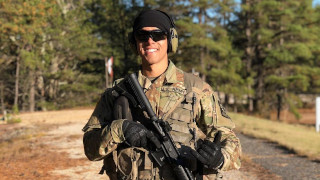
Students, who enter the program as sophomores or juniors, attend the Leader's Training Course for 28 days at Fort Knox, Kentucky in order to validate courses they would have taken during their freshman and sophomore years. Once enrolled in the program, they will participate in physical training, classes, classroom instruction, and field training. Pirate Battalion Army ROTC conducts intense conditioning sessions to improve health and physical fitness throughout the week. Professors, who are first and foremost military officers or senior NCO's, lead Cadets in the classroom by teaching the principles of leadership and military theory. Cadets will then have the opportunity to employ their skills in hands-on practical exercises. Field training provides opportunity for advanced skill set exercises and greater exposure to military tactics and techniques. All committed students will attend the Leadership Development and Assessment Course at Fort Knox, Kentucky for 4 weeks during the summer either between the junior and senior years or following graduation. Students considering ROTC should contact us to determine their eligibility and see how the program can accommodate their specific situation.
Summer Training
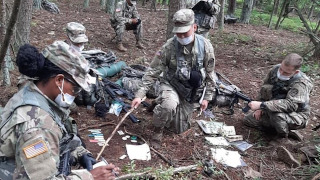
Cadets take part in the Basic Camp when they enter Army ROTC with 2-3 years of college
left. It is a 28-day course held each summer at Fort Knox, KY. All expenses are paid
and students even earn pay while there. This course allows Cadets to "catch up" to
those who completed the Basic Course. The course has four phases. The first phase
introduces Cadets to the Army and prepares them for the next three phases consisting
of team building, leadership development and Field Training Exercises. This is a great
option for entering graduate students or anyone that would complete LTC followed by
2 years at SHU or fellow Cross-Town colleges. 2-year scholarships are usually offered
to cadets that contract after completing LTC, if they meet all other contracting requirements
to include a minimum 2.5 GPA.
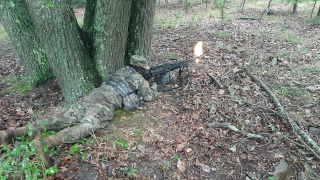
Every Army ROTC Cadet who enters the Advanced Course attends the Cadet Summer Training.
It's a four-week summer course to evaluate and train all Army ROTC Cadets. This course
normally takes place between your junior and senior years of college, and is conducted
at Fort Knox, Kentucky. Learn more »
Special Training
These courses are offered to cadets on a voluntary and limited basis. Unlike LTC and LDAC which are specifically for ROTC cadets, these are regular US Army courses which cadets attend alongside current Army soldiers and officers. These courses are designed to challenge a cadet's mental and physical endurance and toughness.
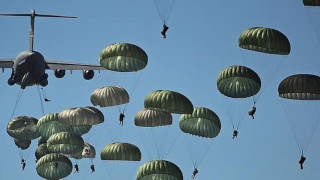
Limited quotas for volunteer airborne training at Fort Benning, Georgia, are available
to cadets who qualify. Applicants must have passed the airborne physical examination
and attained the appropriate score on the Army Physical Fitness Test. Successful completion
of this training entitles the cadet to wear the Army Airborne Badge. The three weeks
of training are divided into ground, tower, and jump week. Learn more »
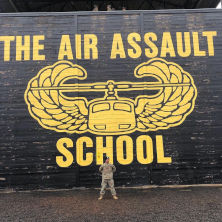
Successful completion of this course allows the cadet to wear the Air Assault Badge.
Requirements for selection are the same as for Airborne training. This 10-day school
is designed to teach air assault skills and procedures, improve basic leadership skills,
and instill the Air Assault spirit. During the course, cadets face such challenges
as an obstacle course, physical training, rappelling, troop ladder, rigging and sling
loading, road marches, and evaluations. The cadet may attend the Air Assault course
at Schofield Barracks, Hawaii or Fort Campbell, Kentucky. Learn more »
Cadet Troop Leader Training (CTLT)
Limited CTLT allocations are available annually to cadets who wish to volunteer to
participate in CTLT. The CTLT program allows selected cadets to be attached to active
duty or Army Reserve and National Guard units and serve in a leadership position.
The program is approximately three weeks in duration, and is available only to third-year
cadets during the same year they attend LDAC. Cadets who attend CTLT are paid at the
same rate as for LDAC. Overseas CTLT tours are usually four weeks. Upon completion
of this assignment, cadets receive a performance evaluation by an officer in the assigned
unit. This evaluation is used by the Professor of Military Science (PMS) when providing
further counseling and leadership training.
Back to the Top >>

